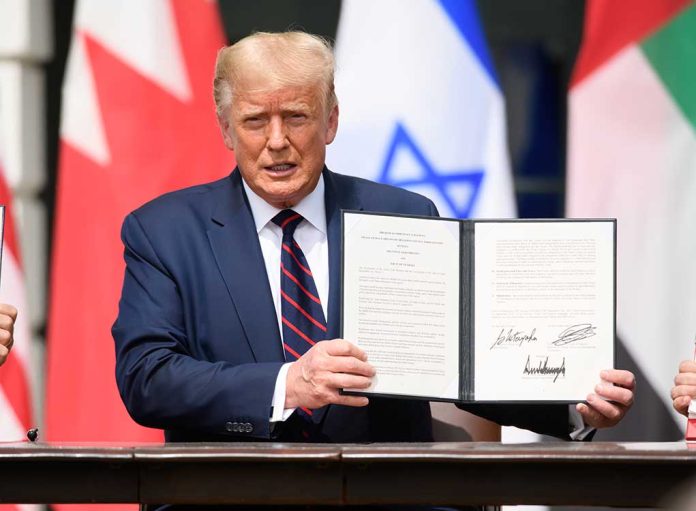
President Trump has signed a sweeping executive order requiring proof of citizenship to vote in federal elections, igniting both praise for election security and criticism over potential voter disenfranchisement.
Key Takeaways
- Trump’s executive order requires proof of citizenship for voter registration in federal elections within 30 days through the Election Assistance Commission.
- The order mandates all ballots be received by Election Day, conflicting with current practices in 18 states and Puerto Rico.
- States that don’t comply with the new requirements risk losing federal funding.
- Legal challenges are expected as critics argue the Constitution grants states primary authority over election processes.
- Despite concerns about voter suppression, Republicans are praising the measure as strengthening election integrity.
New Citizenship Requirements for Federal Elections
President Donald Trump signed an executive order requiring proof of citizenship to register and vote in federal elections. The order directs the federal Election Assistance Commission to implement this requirement within 30 days and instructs the Department of Homeland Security to access state voter rolls to ensure accuracy. This represents a significant shift in federal election policy, with the stated goal of preventing non-citizens from participating in American elections.
The executive order also mandates that all ballots be received by Election Day, eliminating the practice of counting mail-in ballots that arrive afterward but are postmarked before Election Day. This provision contradicts current practices in 18 states and Puerto Rico. States failing to comply with these new requirements face potential withdrawal of federal funding, creating strong incentives for implementation despite anticipated resistance.
WASHINGTON: President Trump signed an executive order mandating a citizenship question on federal voting forms, requiring proof of citizenship before voting. States risk losing funds if they don’t comply, and DOJ will crack down on election crimes. pic.twitter.com/wszkYj1Mym
— KolHaolam (@KolHaolam) March 26, 2025
Republican Support and Democratic Opposition
The order has received strong backing from Republican officials who view it as essential to election integrity. Georgia Secretary of State Brad Raffensperger expressed gratitude for the measure, “Thank you, President Trump, for this executive order ensuring that only American citizens decide American elections.” Similar sentiments have echoed throughout Republican circles, with many viewing the order as necessary to restore confidence in the electoral system.
Democrats and voting rights advocates have expressed serious concerns about the order’s potential impacts. They note that approximately 9% of voting-age citizens lack documentation proving citizenship, potentially disenfranchising millions of eligible voters. Particular concern exists for married women whose names on birth certificates may not match their current legal names, creating registration barriers that could disproportionately affect certain demographics.
Legal Challenges and Constitutional Questions
The executive order is expected to face immediate legal challenges from voting rights groups and Democratic state attorneys general. Critics argue that the Constitution grants states primary authority over election processes, making this federal mandate potentially unconstitutional. Colorado’s Secretary of State has already criticized the order as an unlawful federal overreach, signaling the likelihood of state-level resistance to implementation.
The order also rescinds a 2021 executive order by former President Biden that aimed to boost voter registration. Trump indicated that more election-related actions would follow in the coming weeks, suggesting this order represents just the beginning of his administration’s efforts to reshape election procedures. The controversy touches on fundamental questions about federalism, voting rights, and the proper balance between election security and accessibility.
Current State of Non-Citizen Voting
Despite the urgent tone of the executive order, data suggests non-citizen voting in federal elections is extremely rare. The Heritage Foundation documented only 29 instances of non-citizens voting in federal elections from 2003 to 2023. However, certain municipalities in California, Maryland, Vermont, and the District of Columbia do allow non-citizens to vote in local elections, a practice that has drawn criticism from those concerned about election integrity.
The order directs state and local officials to record and verify citizenship information and requires the Department of Homeland Security to provide “information on all foreign nationals who have indicated on any immigration form that they have registered or voted in a Federal, State, or local election” to relevant election officials. This represents a significant new data-sharing requirement between federal immigration authorities and state election systems.
Sources:
Trump signs broad elections order requiring proof of citizenship
Trump Signs Order Requiring Citizenship Proof to Vote in Elections







